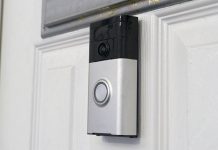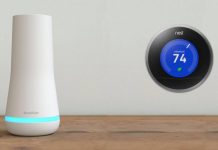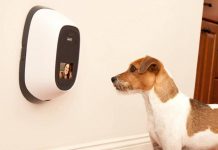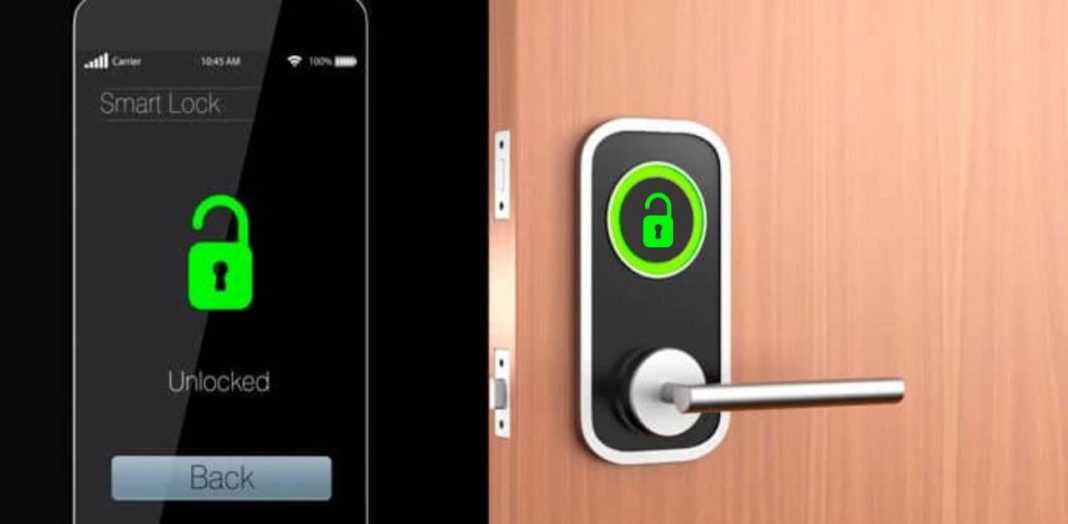UPDATED February 10, 2022 This piece has been updated to reflect the emergence of new technology


Christian Mathews Security Writer
$1.3 Billion. That’s the amount the smart entry door locks market is estimated to be worth globally, up until the year 2018. This is according to data from Wired Release that was featured on Associated Press News. This figure is expected to increase as more users begin to see the endless possibilities that come with IoT devices.
There’s nothing not to love about smart entry door locks, what with all the extras that come with them, compared to traditional door locks.
And as a business owner, there are many benefits that you stand to gain with using smart entry door locks for your business.
Think of the many times you weren’t sure you locked the doors, or maybe, you now have to change locks just because you fired an employee. With smart entry door locks, you can – check on the status of your doors whether they are locked or not, remotely on your phone; as with changing the locks, for a smart entry lock, you’d simply just need to change access codes or reprogram new access credentials to the system.
1Smart Door Locks for Business
What are smart entry door locks in the first place? Wikipedia defines smart door locks as “electro-mechanical” locks, which either lock or unlock a door when issued with the correct/ authorized credentials. Compared to the largely “mechanical” traditional door lock, smart door locks are slowly phasing out the use of traditional door locks.
You’ve probably encountered a smart door lock at some point. Maybe it was at an office or a hotel room where you had to swipe a card to unlock the door, or even with your car that features keyless entry.
Point is, smart door locks and entry systems are ubiquitous in today’s world.
So why should you be using smart entry door locks in your business?
Other than smart door locks offering standard if not better security than their traditional lock and key counterparts, smart door locks offer more convenience to you as a business owner, along with a set of features you can use to better your business.
Convenience – as a business owner, your focus and priority should be on strategizing how you can best position your business for success. With smart entry door locks, you won’t have to worry about changing locks at your premises each time you lay off an employee, you can always remotely lock or unlock doors at your premises, etc.
More control – with smart door locks, you can always verify which employee is at work, and at what time they arrived for work. Since most smart locks access credentials (whether in the form of smart access cards, or even biometric access systems) are user-specific, you can easily generate logs from the system to verify who failed to show up, or the number of hours worked.
Security – smart door locks can’t be “picked” as a traditional door lock would be. For a would-be burglar to break into your smart door lock system, they’d have to be skilled above average, and going with this, chances are quite slim. Most would-be burglars would rather target premises whose locks can be easily picked, or even pried open with a good old crowbar.
Additionally, some of these smart entry door locks can be integrated with other devices such as the camera facing your door, or even the doorbell camera. This way, you can always check on the status of your doors, or even check on who’s to open a door.
2Smart Keyless Entry Door Locks
Smart keyless entry door locks are just that, “keyless”. They don’t require a physical key to either lock or unlock the door.
But how do they do that? By having authorized credentials communicated to the smart door lock. This may be in the form of key fobs, smart cards, smartphones, etc.
Most smart cards and commercial key fob door entry systems communicate with the lock using Radio Frequency Identification (RFID) technology. However, there’s an even more convenient keyless entry option out there, smartphones.
Using data from your smartphone (like location data, Bluetooth signal), smart keyless entry door locks can unlock as soon as you get to the door, or even lock the door once you leave the house.
With smartphones, the most commonly used communication protocols are Bluetooth, Wi-Fi, and Z- wave.
3Smart Door Lock WiFi
Some smart entry door locks come with inbuilt Wi-Fi capability, while for most of the options out there, you’d have to buy an optional accessory to get Wi-Fi connectivity.
For smart door locks with inbuilt Wi-Fi, there’s always the issue of the battery draining faster. On a positive note though, with Wi-Fi capability, once you’ve connected your smart door lock to the internet via your router, you can remotely access and control your premise’s doors from anywhere provided you have access to the internet.
4Bluetooth Keyless Entry Smart Door Lock
The best part about smart locks with bluetooth is you won’t have to worry about the battery running out. This is because bluetooth uses very little battery power.
However, Bluetooth connectivity is severely limited by range. So, while you or your employees can lock or unlock your premises doors remotely, you’d have to be within the range of at most 300 feet.
5Smart Entry Door Locks with Z-Wave
Z-Wave is a communication protocol that ties together all the smart devices in your home.
Utilizing low-energy radio transmission, Z-wave enables smart devices at your business premises to communicate with each other if you have some kind of smart hub. Additionally, you can pair this with a Wi-Fi connection giving you the ability to remotely access and control door locks at your premises.
If you intend to integrate your smart keyless entry door lock with other components at your business, say the thermostat, lights, or even the alarm system, then smart entry door locks with Z-Wave capability as a feature would be best when choosing the right smart keyless door lock.
6Smart Door Lock Keypad
To open such a lock, you’ll need to key in the correct access codes on a keypad attached to the smart lock.
Most smart door locks even feature individual-specific access codes that you can assign to your employees and yourself. With this, you can tell specifically who has entered your business premises and at what time.
7Smart Voice Lock / Fingerprint Smart Door Lock
Smart voice lock and fingerprint sensor door locks utilize an individual’s biometric data to either grant or deny them access to your premises.
If your business involves high stakes, requires confidentiality or you want the best security for small business, then smart voice lock or fingerprint sensor door locks should be your pick.
The very fact that they use biometric credentials means that the chance of corrupting them is very minimal.
Additionally, they come with the whole “keyless entry” concept, meaning you and your employees have a more convenient experience. So, no need to remember passwords/access codes, or even carrying key fobs/smart entry cards.
8Conclusion
That’s it for smart entry door locks for your business.
To clarify, while smart door locks are relatively secure, there’s always the issue of IoT devices being vulnerable to sustained cyber-attacks. For this reason, you’d be better off using smart entry door locks from trusted and reputable firms, while also ensuring you get smart lock systems that feature at the very minimum; encryption of data, and even Transport Layer Security (TLS) or Secure Sockets Layer (SSL).

















































